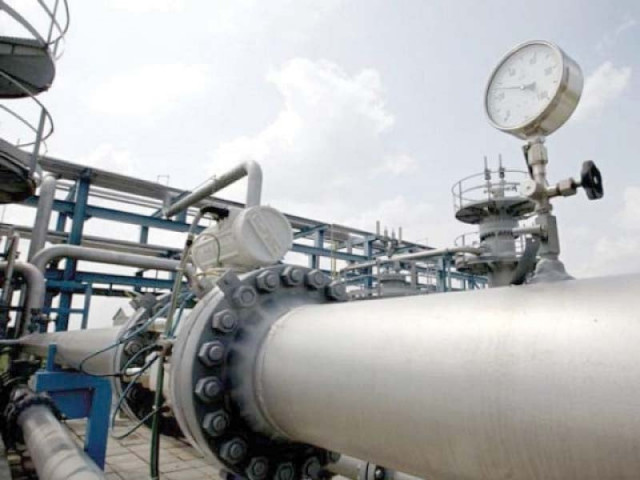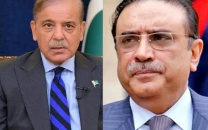Gas prices to triple as subsidies for rich remain
ECC okays increase of up to 193% to recover Rs350b from consumers for saving utilities from bankruptcy

The caretaker government on Monday approved up to 193% increase in gas prices to recover additional Rs350 billion from consumers for saving gas companies from bankruptcy but turned down a move to completely abolish subsidies for richest exporters and industrialists.
For the domestic consumers, the prices have been increased up to 172% while for commercial consumers the increase is 137% and for cement manufacturers the increase in gas prices was 193% with effect from November 1.
The Economic Coordination Committee (ECC) of the Cabinet allowed the increase in gas prices for domestic, commercial and the compressed natural gas (CNG) users in addition to raising tariffs for only cement manufacturers.
It also approved import of 1 million metric tons of wheat and 200,000 metric tons of urea to meet the country’s needs. Only the wheat import would cost the country over $250 million at existing international market rates.
Caretaker Finance Minister Dr Shamshad Akhtar chaired the ECC meeting, which endorsed a summary of the Petroleum Division for increasing the gas prices with effect from November 1. The matter would now be submitted before the federal cabinet for formal endorsement.
“The ECC approved the summary of the Petroleum Division for increase in gas prices,” said Energy Minister Mohammad Ali said after the meeting.
The finance ministry and the Planning Commission opposed provision of gas to the self-generation power plants, owned by the exporters and those industrialists selling goods in the local market. The ECC, however, overruled their objections and agreed to provide up to 44% subsidised gas to the exporters.
The decision is in violation of the federal cabinet’s decision in 2021, where it had been decided to cut gas to those self-generation plants.
Industry Minister Gohar Ejaz said that the gas prices for exporters and the domestic industrialists had also been increased to an average of $8.5 per mmbtu. But these rates are still $4 lower than the prevailing liquefied natural gas (LNG) rates.
The government has not increased the gas prices for domestic consumers of up to 0.9 hm3 consumption. However, their fixed monthly bill has been increased from Rs10 to Rs400. The fixed monthly charge for consumption up to 1.5 hm3 has been increased from Rs460 to Rs1,000 while for consumption of over 1.5 hm3 it has been increased to Rs2,000 per month.
The tariffs for the highest domestic consumption are aligned with liquefied petroleum gas (LPG) cost, according to the decision. The previous slab benefits are being maintained up to consumption of 4 hm3 but there will not be previous slab benefits in the last slab of non-protected domestic category.
The gas price for up to 0.25 hm3 consumption has been increased by 50% to Rs300 per mmbtu, for 0.6 ohm 3 consumption has been doubled to Rs600 and for 1 hm3 consumption the rate is increased to Rs1,000 per mmbtu – an increase of 150%.
For up to 1.5hm3 consumption, the ECC doubled the rate to Rs1,200 per unit, for up to 2 hm3 consumption it is also doubled Rs1,600 per mmbtu. For up to 3 hm3 consumption the maximum increase of 172% has been approved and the new price at Rs3,000 per mmbtu is set.
The rates for the upper two slabs have been increased even higher than the LGP and the LNG prices. For 4 hm3 consumption, it has been increased to Rs3,500 per mmbtu and for the highest slab it has been jacked up to Rs4,000 –much higher than imported gas price – to pay for subsidies to the richest.
The price revision for all categories of gas consumers is essential to prevent the two gas distribution companies – the Sui Northern Gas Pipelines Limited (SNGPL) and the Sui Southern Gas Company Limited (SSGCL) – from bankruptcy.
The gas sector circular debt has already peaked to Rs2.1 trillion and an increase in prices would help companies recover additional Rs395 billion from the consumers. The Oil and Gas Regulatory Authority (Ogra) has determined total revenue requirement of Rs697 billion for SNGPL and SSGCL for this fiscal. The SNGPL’s requirement is estimated at Rs358 billion while SSGCL’s needs are assessed at Rs339 billion.
The ECC approved increasing the prices of gas being consumed by exporters from Rs1,100 to Rs2,050 per mmbtu, an increase of Rs950 or 86%. But the rates are still Rs1,600 per mmbtu lower than the imported gas prices.
Due to shortage of local gas, Pakistan imports expensive LNG and supplies it to the domestic sector in winters and to the industry throughout the year. The current cost of imported LNG was Rs3,650 or $12.5 per mmBtu.
At the current rates, the exporters would get a subsidy of Rs1,600 per mmbtu, which is equal to 44% of the imported gas price. The subsidy will be paid by charging higher gas rates from domestic consumers having higher consumption, CNG consumers, commercial consumers and cement manufacturers.
Similarly, for industrialists who do not export goods but have captive plants, the ECC increased the prices from Rs1,200 to Rs2,600 per mmbtu, an increase of Rs1,400 or 116%. But still these rich industrialists would get a subsidy of Rs1,050 per mmbtu, equal to 29% of the imported gas price.
The finance ministry officials pushed the ECC to consider its decision about provision of subsidised gas to the exporters. The Planning Commission also supported cutting the gas supplies to the export industries and giving it to efficient power plants to achieve lower generation cost. But the ECC did not agree.
Wheat import
The ECC also allowed import of 1 million metric tons of wheat to maintain strategic reserves.
Wheat availability for this fiscal year is estimated at 29.81 million metric tons but there will be a shortfall of 2.4 million tons, while keeping in mind the country’s strategic requirements.
The country has 7.9 million metric tons of wheat stocks as of last week. The wheat prices in Pakistan remain high at Rs4,823 per 40 kilogrammes or Rs121 per kg, according to the Pakistan Bureau of Statistics.
The food ministry has attributed the increase to hoarding, smuggling, low public stocks and delay in public stock releases to flour mills.
Passco and provincial food departments could only achieve the 75% assigned target of wheat procurement. Against the target of 7.8 million metric tons, all the departments could collectively buy 5.87 million metric tons.
The ECC was informed that the imported wheat price was $245 per metric ton and after adding the freight cost it would reach Karachi at a price of Rs87 per kg -28% cheaper than the local wheat price.
The ECC also allowed import of 200,000 metric tons of urea to meet the requirements for wheat sowing season. The ECC instructed for ensuring the provision of local gas to two fertiliser manufacturing plants to the extent possible.
The ECC allowed the release of Rs200 million for payment of salaries of the defunct Earthquake Reconstruction and Rehabilitation Authority (Erra) as against the demand of Rs488 million.
There is no provision of money for Erra in the budget, as the organisation has been closed down many years ago but the government is helpless in front of those who are sitting at the helm of the country’s affairs.



















COMMENTS
Comments are moderated and generally will be posted if they are on-topic and not abusive.
For more information, please see our Comments FAQ